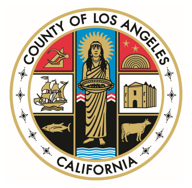 | LOS ANGELES COUNTY
DEPARTMENT OF MENTAL HEALTH | | | Policy 106.05 Fraud, Waste, and Abuse Prevention
| | Policy Category: Administrative | | Distribution Level: Directly Operated Programs and Contracted Agencies | | Responsible Party: Compliance, Privacy, and Audit Services | | | | Approved by Marvin J. Southard, DSW, Director, on January 1, 2007 | | | |
|
| I. PURPOSE
| | To communicate with the Department of Mental Health (DMH/Department) principles and policies for preventing, detecting, and correcting, fraud, waste, and abuse, and to promote and maintain the highest in ethical and legal conduct throughout DMH and its Mental Health Contractors.
To communicate with Mental Health Contractors that they must adopt and abide by this policy for the prevention, detection, and correction of fraud, waste, and abuse, so as to promote and maintain the highest in ethical and legal conduct.
| | II. DEFINITIONS
| | Fraud: An intentional deception or misrepresentation that an individual knows, to be false or does not believe to be true and makes, knowing that the deception could result in an unauthorized benefit to himself/herself or another person.
Waste: The extravagant, careless, or needless expenditure of funds or consumption of resources that results from deficient practices, poor systems controls, or bad decisions. Waste may or may not provide any personal gain. Waste is not necessarily illegal; however, it hurts the organization by depleting it resources.
Abuse: Incidents or practices by providers, which although not usually considered fraudulent, are inconsistent with accepted sound medical, business or fiscal practices that directly or indirectly create unnecessary costs to the Medicare Program.
The False Claims Act: (31 USC 3729-3733) A federal statute used to combat fraud against the United States. Key False Claims Act provisions holds the claimant responsible for submitting only claims for services that are provided in accordance with governmental requirements and which are complete and accurate. It states that a responsible person or entity cannot act with actual knowledge of falsity, or in deliberate ignorance, or in reckless disregard of the truth or falsity of information used to prepare or support claims.
The State also has enacted a False Claims Act under the Government Code Sections 12650-12656 to combat fraud. The State language closely parallels the Federal language and holds the claimant responsible for completing correct and/or legal reimbursement claims for services or goods.
Other Workforce Members: refers to residents, interns, students, volunteers, and locum tenens.
Mental Health Contractor: Any contractor, subcontractor, agent, or other person which or who, on behalf of the entity, furnishes, or otherwise authorizes the furnishing of, Medi-Cal health care items or services, performs billing or coding functions, or is involved in the monitoring of health care provided by the entity.
| | III. POLICY
| | DMH and Mental Health Contractor operated sites shall provide mental health services and related administrative activities in a manner that meets the highest standards of business and professional ethics.
DMH and Mental Health Contractor operated sites shall comply with applicable Federal, State, and County, statutes, laws, regulations, policies and procedures. This includes, but is not limited to the Federal False Claims Act and the State False Claims Act.
DMH and Mental Health Contractor employees, and other workforce members, are required to report any actual or perceived compliance violations to persons within their organizations who are charged with reviewing and remediating such violations. At DMH, the areas charged with this responsibility are the area supervisor, the Program Manager, or the Compliance Program Office (CPO).
DMH will maintain a set of policies and procedures for purposes of: -
Creating and maintaining an ethical and honest environment; -
Providing employees with procedures for their work product; -
Providing employees with information regarding expected workplace behaviors, (referring to the Code of Organizational Conduct, Ethics, and Compliance) -
Ensuring proper internal controls are in place. | | IV. PROCEDURES
| | | | V. AUTHORITIES
| | | | VI. ATTACHMENTS
| | | |
|